- Home
- Scott Mariani
The Doomsday Prophecy Page 11
The Doomsday Prophecy Read online
Page 11
She said nothing.
‘Zoë Bradbury. Where is she?’
She didn’t reply.
‘Who bombed the café?’ he asked. ‘Was it to kill Charlie?’
‘I don’t know what you’re talking about.’
He fired. She screamed and drew her hand away from the floor.
‘You’re fine,’ he said. ‘I aimed between your fingers. Next time I’ll take one off. Let’s start again. Zoë Bradbury. Where is she?’
‘Gone,’ she whispered.
‘Co-operation. That’s good. Gone where?’
She hesitated.
‘Pick a finger,’ he said. ‘Maybe one you don’t use much. Hold out your hand. That way I won’t hit anything else by mistake.’
‘She’s not in Greece any longer.’
‘Then where is she?’
‘You’ll kill me anyway,’ she said. ‘Why should I tell you?’
‘I’m not like you,’ he replied. ‘I know the kind of treatment you had in mind for me tonight if I didn’t answer your questions. But I’m not a senseless killer. If you tell me where she is, what’s going on, and who you are, you won’t be harmed. I’ll put you where nobody can find you. When I find Zoë safe and well, I’ll come back and maybe I’ll let you walk free. It’s your choice. But understand that if you don’t tell me, you’re dead. Right here, right now. No more finger games.’ He aimed the pistol at her forehead.
‘Who the hell are you?’ The Spanish accent was less pronounced now. She sounded distinctly American.
‘Nobody. Last chance. Where is she?’
The woman heaved a sigh. ‘She’s been taken to the US. Five days ago.’
‘Good. We’re getting somewhere. Where exactly in the US, why and by whom?’
‘I don’t know everything,’ she said. ‘I just do what I’m told to do.’
‘Who tells you? Give me names.’
‘I don’t have any names to give.’
‘What’s yours?’
‘Kaplan. Marisa Kaplan.’
He watched her eyes and believed her. He pointed back at the fair-haired man on the floor. ‘What was his?’
‘Hudson.’
‘Why are you here, Marisa? Who planted the bomb?’
Then the room was filled with noise. Ben felt the shockwave of a bullet pass close to his ear. A wall-light shattered. He whirled round and fell back simultaneously, returning fire. The Beretta kicked in his hands. The fair-haired guy was half-raised on one elbow, and the gun in his bloody fist was a small backup revolver. It fired again. The second shot went through the cuff of Ben’s shirt.
Ben fired back. Saw the bullet strike. Fired again. The guy’s eye disappeared and his head dropped to the floor. There was blood up the wall behind him.
Then there was silence again. Ben clambered to his feet and checked himself. He wasn’t hit. But the intruder was definitely dead this time. Ben kicked the.357 Magnum snubby backup piece away across the floor.
He heard a tiny sound behind him. He turned. The woman called Kaplan was sitting up, staring at her stomach. The blood was spreading fast over her cream dress. She clutched at the wound that her partner’s stray shot had punched into her gut, trying to tear the cloth to get to it. Her mouth opened and closed. Then she slumped backwards and died.
Chapter Twenty-Two
Creating corpses was much quicker and easier work than disposing of them afterwards. Ben found some heavy-duty plastic garbage sacks in the kitchen of the beach house. Stepping over the pools of blood on the tiles, he tore two sacks off the roll, opened them out and spread them on the floor in the passage near the front door.
He took Kaplan by the wrists and dragged her. Her head hung down, eyes still open, her hair trailing in the slick of blood on the tiles. He dumped her corpse on top of one of the garbage sacks, walked back across the room to Hudson’s body, bent down and grabbed his ankles. Hudson was much heavier and much more bloody. His right eye socket and cheekbone were smashed by the impact of the 9mm bullet from his partner’s gun. Ben dragged him over the tiles and left him lying next to Kaplan.
He crouched over them and frisked them carefully. No papers, no personal items of any kind. Hudson had a phone in his back pocket. He found Kaplan’s in her handbag. With a phone in each hand he redialled the last call she’d made, and Hudson’s phone vibrated in his other hand. He checked through their call records. The two phones had been used only to call each other.
Ben left the corpses lying there and started cleaning up the house. The broken wall-lamp had sprayed glass shards over part of the floor, and he swept them up with a dustpan and brush and shook them out into the bin. In a kitchen cupboard he found a mop and bucket and a bottle of bleach. He filled the bucket with cold water, lugged it through to the other room and started mopping up the worst of the blood. Once that was done, he used a kitchen knife to hack at one of the doorframes, where a bullet had embedded itself deep into the wood. He dug the flattened 9mm bullet out and dropped it in his pocket. He winced at the mess he’d made of the doorframe.
As he worked, he was thinking hard. Kaplan and Hudson hadn’t been the best surveillance and hit team he’d ever seen, but they hadn’t been the worst, either. The two Berettas were the exact same make and model. The serial numbers had been expertly removed. Those kinds of details pointed to a professional outfit. He was pretty certain that they had been sent to kill Nikos Karapiperis. If Nikos had really been involved in drugs, he wouldn’t have gone to Charlie for help to find Zoë. So the killers had planted the drugs on him. That was a neat touch. Then the bombing had been orchestrated to eliminate Charlie, after they’d seen him talking to Nikos. And it wasn’t a difficult step from there to figure out that they’d come after Ben for the same reason.
Those pieces slotted together neatly enough. But when Zoë Bradbury was factored into the equation, it started falling apart. There was no ransom demand. No apparent reason for snatching her. Her parents were hardly the kind of people who could be screwed for millions to get their daughter back. If Tom Bradbury had been in politics or some other kind of position to be privy to valuable information, it might have made sense. But he wasn’t. He was a theology scholar in one of the world’s dustiest institutions, about as remote from the real world as it was possible to get.
So whatever reason was driving someone to these extremes, it had to come from Zoë herself. But what was it? He thought about the money. She’d apparently got hold of twenty thousand dollars fairly easily, and was expecting a lot more to come soon. It certainly sounded like a blackmail deal. Whoever she was extorting the money from had to be pretty rich and powerful, and they were clearly desperate. Which meant that whatever she was threatening them with, it was real enough to be taken very seriously.
But why go to the trouble of moving her halfway across the world to the States, when it would have been so easy just to put a bullet in her head right here on Corfu? He thought about it and could come to only one conclusion. She had something they wanted, and they wanted to keep her alive until they got it.
But that led to another problem. Kaplan and Hudson weren’t soft types. They were ready and willing to kill. And Zoë wasn’t a soldier trained to resist interrogation. If all they wanted was to make her talk, it would have taken just a few seconds to get the information out of her. Just the sight of a knife or a gun and, like the vast majority of ordinary people, she would fold instantly.
After that, they probably would kill her. And after twelve days, there was a good chance that she was dead already.
At three-thirty in the morning, the beach taverna started closing up for the night. The last of the stragglers wandered off homewards. The music stopped and the lights went off, leaving the beach in darkness.
Ben watched and waited for another half hour. The sands were deserted. He stuffed a Beretta in each of his jeans pockets, pushed open the front door and dragged Hudson’s corpse out across the sand, sliding him along on the plastic sack.
It was a long drag, a
nd a dead body on sand was a heavy weight. The pull on the stitches in Ben’s neck was agonising, and the muscles in his shoulders and forearms were pumped full of lactic acid by the time he reached his chosen spot a hundred yards away. He left the corpse in a nook between two dunes and walked back, breathing hard.
Back at the house, he took Kaplan’s wrists, gritted his teeth and hauled her out onto the beach. As her head lolled and bounced he kept imagining that her staring eyes were meeting his. He didn’t like to see a woman dead like this, and he was glad that he hadn’t been the one to kill her.
With the two bodies piled up next to him in the moonlight, he kneeled in the sand and dug a shallow hole in the crook of the two dunes. He rolled them in one at a time with his foot. Kaplan flopped in first, and Hudson sprawled in on top of her with a meaty sound as their heads collided.
Ben filled the hole back in with sand. They were food for crabs now.
Searching around, he found the barnacled carcass of an old rowing boat and hauled it across the sand. He laid it over the shallow grave and walked away towards the water’s edge. Retracing his footsteps he kicked over the tracks in the sand to hide them. Then he stripped the two pistols and threw the bits into the sea.
Dawn was creeping up on the horizon by the time he finished cleaning up at the house. He showered and changed, burned the bloodstained jeans and shirt on the beach, and stamped the ashes into the sand. He left five hundred euros on the table and a note to apologise for breaking a lamp and damaging a doorframe, saying he’d drunk too much of the fine wine Spiro and Christina had left for him.
Then as the sun was breaking free of the sea, he left the house and started walking towards town. He took a taxi to the airport, careful that he wasn’t being followed. The last thing he needed now was for Stephanides’ men to grab him just as he was about to leave Greece. He’d be in America long before they even noticed he was gone.
At the airport he retrieved his passport from the locker, and used his return ticket to board an early flight to Athens. At midday, Greek time, he was sipping whisky on the rocks in the half-empty business class section of a 747 heading for Atlanta.
He didn’t know what awaited him in the USA. But he was going to find Zoë Bradbury, dead or alive.
And then, someone, somewhere, was going to pay.
Chapter Twenty-Three
Georgia, USA
The thirteenth day
Georgia wasn’t any noticeably hotter than Corfu, but it was about twice as humid. Ben’s shirt was stuck to his back within fifteen minutes of stepping off the plane at Atlanta Hartsfield-Jackson Airport.
He adjusted his watch to US time. The zone shift meant that he was arriving pretty much the same time he’d left Greece, and the sun was high overhead. He hired a big silver Chrysler at the airport and drove the long distance to Savannah with the windows down and the wind in his hair.
It was late afternoon by the time he got there. Savannah was rich and verdant with picture-perfect colonial homes that looked as though they hadn’t changed since Civil War times. The first thing he did was to phone the number on Steve McClusky’s business card. But when he tried it, all he got was a message to say the number had been cut off. There was no landline number, and there was no S. McClusky, Attorney, listed in Yellow Pages. But he still had the address. He checked his map and turned the big Chrysler round.
He found McClusky’s building on the edge of town, far away from the opulence of the old houses and the tree-lined streets. He’d been expecting some kind of proper law firm offices, either an imposing glass-fronted modern building or some elegant old colonial-style place with columns and steps leading up to the front door. What he found instead was a little old barber’s shop in the middle of a crumbling block. There was a small parking space outside, with yellowed weeds growing though the cracks in the concrete. He looked twice at the address on the card. It was the right place.
A bell tinkled overhead as he walked in the door. It was cool inside, air conditioning working full blast. He glanced quickly around him. The fittings were straight out of the fifties, and the old barbers themselves looked as though they’d been there at least as long. One of them was busy cutting the hair of the single customer in the place. The other was perched up on a stool, sipping a can of lite beer. He was stooped and white and looked like an iguana. A young guy of about eighteen in an apron was sweeping up bits of snipped hair from the tiles.
The old barber with the beer turned towards the newcomer. ‘What can we do for you, mister? Haircut or a shave?’
‘Neither,’ Ben said. ‘Where can I find Steve McClusky?’
‘That would be Skid you’re looking for.’
‘The name on the card is Steve McClusky.’
The old man nodded. ‘That’s him. Skid McClusky.’
‘Why do they call him that?’
The barber grinned. He had no front teeth. ‘Well, some folks say it’s the way he drives that Corvette of his. Others say Skid Row’s the place he’ll wind up, if he ain’t there already.’
‘His card says his offices are at this address.’
‘Right there.’ The old barber pointed a scraggy finger at a door in the corner. ‘Up the stairs, turn left. Ain’t much to look at, though.’
‘Thanks.’ Ben headed towards the door.
‘Save yourself the trouble, mister. You won’t find Skid there.’ The barber grinned again, flashing pale gums. ‘No, sir.’
‘So where is he? I need to talk to him.’
They all laughed. ‘Get in line, mister,’ the old man said. ‘There’s a bunch of us who’d like to talk to that sonofabitch. Skipped out of here without paying his rent. Been gone more’n two weeks.’
‘So you don’t know where he is?’
‘’Fraid I can’t help you there.’
He’d come a long way and this wasn’t a great start. ‘Thanks anyway.’ Ben turned and pushed back through the door. The bell tinkled again. He walked out into the hot sun and made his way towards the car, bleeping the locks as he approached. He yanked open the driver’s door and was about to climb in when he heard running footsteps come up behind him.
He turned. It was the young guy from the barber’s shop. The apron was gone, under it a faded Jimi Hendrix T-shirt. ‘Mister,’ he said. ‘Wait a minute.’ The teenager was looking over his shoulder back at the place as though he was scared they might be watching him from inside. Must have slipped out the back way, Ben thought.
The teenager looked anxious and sincere. Whatever he was about to say, Ben believed it.
‘Skid’s in some kind of trouble, mister.’
‘What kind of trouble?’
‘Don’t know for sure. Something real bad. That’s why he’s gone.’ He paused. ‘Skid’s always been good to me. Loaned me money when I needed it.’
‘If Skid’s in trouble, I might be able to help him,’ Ben said. ‘Do you know where I can find him?’
The kid shook his head. ‘I know someone who might.’
‘Can you pass on a message to them?’
The kid threw another jittery glance back at the barber’s shop. He looked back at Ben and nodded.
‘Tell them a friend of Zoë Bradbury, from England, needs to talk to Skid. It’s important and urgent. Got that?’
‘Zoë Bradbury,’ the kid repeated.
‘If Skid gets the message he’ll understand. He needs to call this number.’ Ben scrawled it on a piece of paper and handed it to the kid together with a twenty-dollar bill. The young guy nodded, turned and ran back towards the rear of the barber’s shop.
It was about an hour later, as Ben was driving back towards the middle of town, looking around for a hotel, that his phone buzzed on the dashboard. He picked it up.
‘Who I am talking to?’ said a man’s voice, nervy, aggressive.
Ben didn’t like the challenging approach but he bit his tongue. ‘I’m Ben Hope. Who’s this?’
‘Never mind who I am,’ the voice said harshly. The tone of some
one working hard to cover up their fear. Someone clearly under a lot of strain. He gave Ben the name of a bar near a place called Hinesville, a few miles southwest of Savannah, and some rough directions to find the place. ‘Be there tonight at seven thirty.’ Then he hung up.
Anonymous rendezvous were not something Ben very much liked, but in his line of work he got a lot of weird calls from people too scared to give their identity away. Experience had proved that it was usually worth chasing them up, even it was just part of the process of elimination.
He checked his watch. A couple of hours to get there. He swung round and headed southwest, away from the neat white colonial houses and emerald lawns and the cool shade of the tree-lined streets. He stopped at a roadside diner and drank four cups of the best coffee he’d ever tasted outside Italy. Then he checked the time again, got back in the car and drove at a steady sixty towards his RV.
Music was thumping through the barroom walls as Ben stepped out of the Chrysler and walked up to the door. He swung it open and the noise of the country rock beat hit him, along with the heat and the smell of smoke, beer and a hundred tightly-packed bodies. He cast his eye around the place. There was a rebel flag hanging over the bar, below a couple of crossed sabres. Waitresses in high heels, tiny denim shorts and cut-off T-shirts were weaving between the tables. On a low stage there were electric guitars, a bass, a sprawling drum kit and a mountain of speakers and amplifiers set up and waiting for the band to come on.
Ben pushed through the crowd and headed the way the voice on the phone had told him to. A door between a pinball machine and a payphone led him up a dark flight of creaky wooden stairs. He walked along a dingy corridor. The music was pumping up from below, vibrations pulsing under his feet. It would probably get about twice as loud when the band started to play. He came to a door, and knocked.

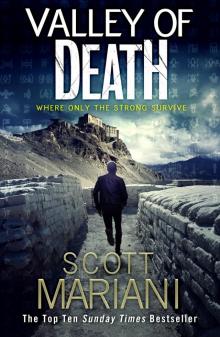 Valley of Death
Valley of Death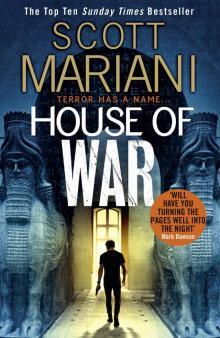 House of War
House of War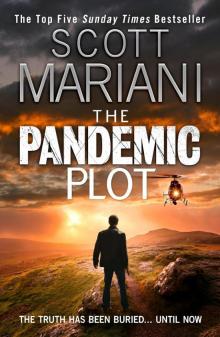 The Pandemic Plot
The Pandemic Plot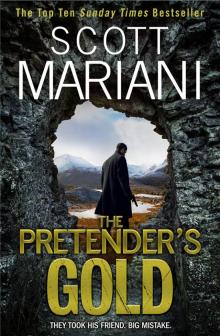 The Pretender's Gold
The Pretender's Gold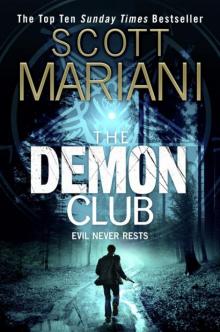 The Demon Club
The Demon Club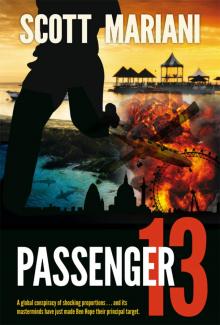 Passenger 13 (Ben Hope eBook originals)
Passenger 13 (Ben Hope eBook originals)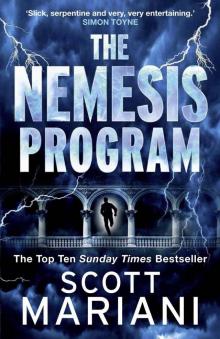 The Nemesis Program_Ben Hope
The Nemesis Program_Ben Hope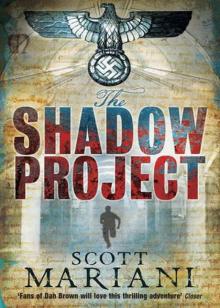 The Shadow Project
The Shadow Project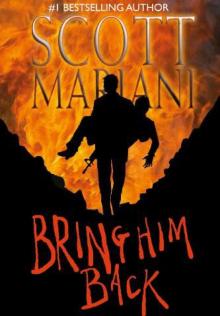 Bring Him Back
Bring Him Back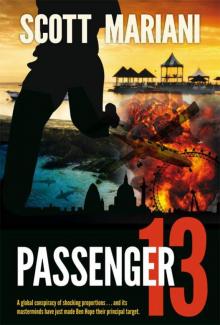 Passenger 13
Passenger 13 Sacred Sword (Ben Hope 7)
Sacred Sword (Ben Hope 7)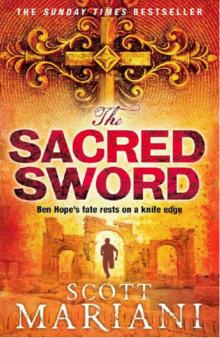 The Sacred Sword (Ben Hope 7)
The Sacred Sword (Ben Hope 7)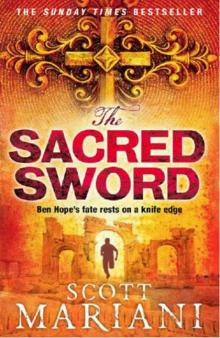 Sacred Sword
Sacred Sword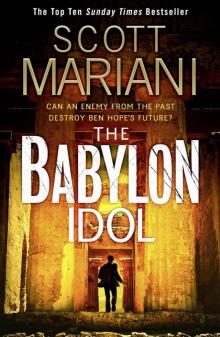 The Babylon Idol
The Babylon Idol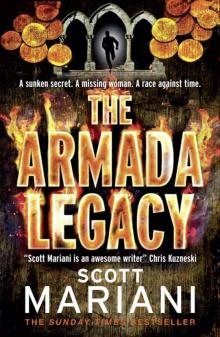 The Armada Legacy
The Armada Legacy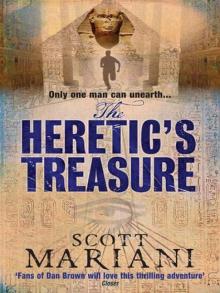 The Heretic's Treasure
The Heretic's Treasure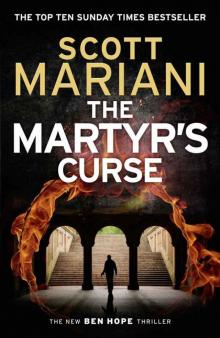 The Martyr’s Curse
The Martyr’s Curse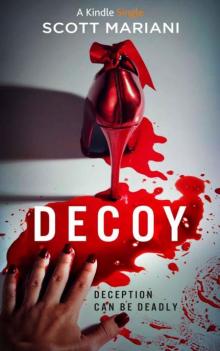 DECOY (Kindle Single)
DECOY (Kindle Single)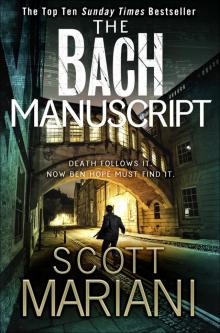 The Bach Manuscript
The Bach Manuscript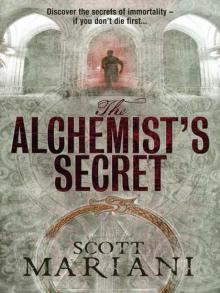 The Alchemist's Secret
The Alchemist's Secret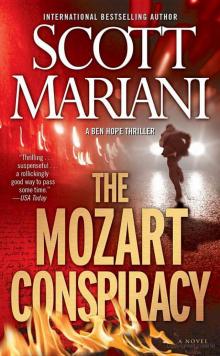 The Mozart Conspiracy: A Novel bh-2
The Mozart Conspiracy: A Novel bh-2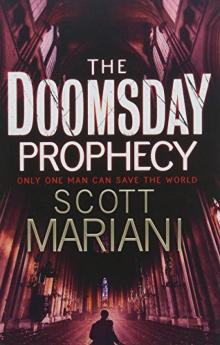 The Doomsday Prophecy
The Doomsday Prophecy The Ben Hope Collection: 6 BOOK SET
The Ben Hope Collection: 6 BOOK SET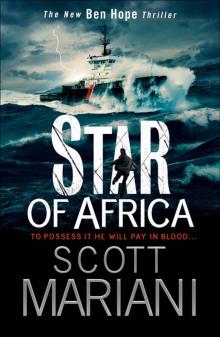 Star of Africa (Ben Hope, Book 13)
Star of Africa (Ben Hope, Book 13)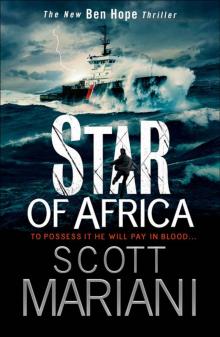 Star of Africa
Star of Africa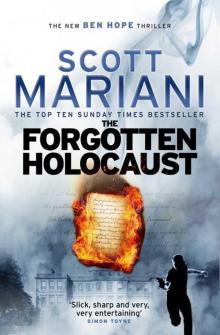 The Forgotten Holocaust (Ben Hope, Book 10)
The Forgotten Holocaust (Ben Hope, Book 10)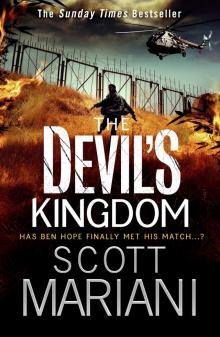 The Devil's Kingdom
The Devil's Kingdom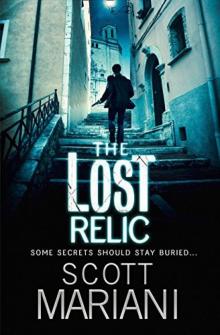 The Lost Relic
The Lost Relic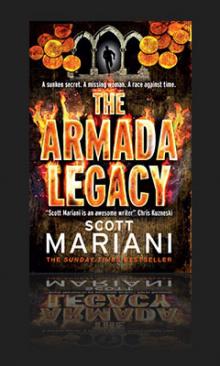 The Armada Legacy bh-8
The Armada Legacy bh-8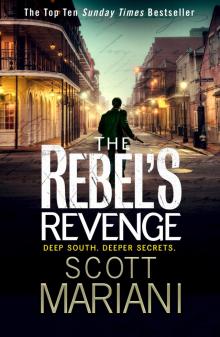 The Rebel's Revenge
The Rebel's Revenge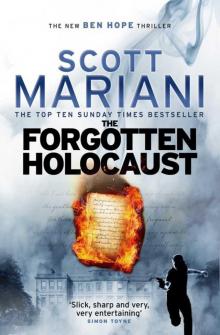 The Forgotten Holocaust
The Forgotten Holocaust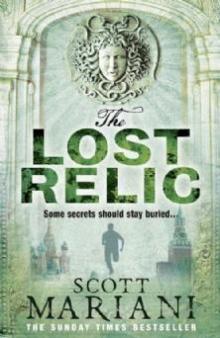 The Lost Relic bh-6
The Lost Relic bh-6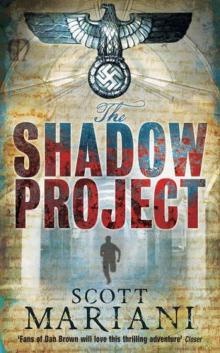 Ben Hope 05 - The Shadow Project
Ben Hope 05 - The Shadow Project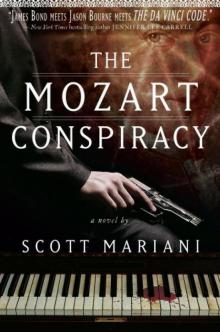 The Mozart Conspiracy
The Mozart Conspiracy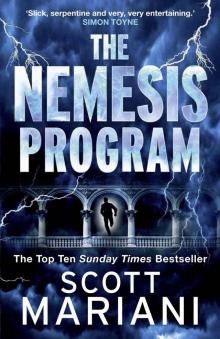 The Nemesis Program
The Nemesis Program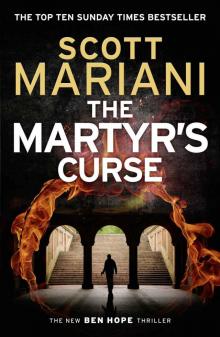 The Martyr’s Curse (Ben Hope, Book 11)
The Martyr’s Curse (Ben Hope, Book 11)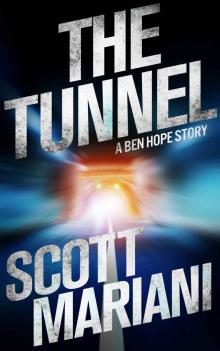 THE TUNNEL: A Ben Hope Story
THE TUNNEL: A Ben Hope Story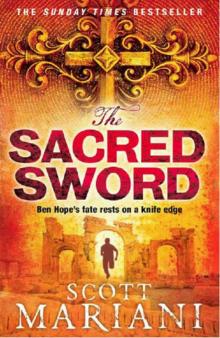 The Sacred Sword bh-7
The Sacred Sword bh-7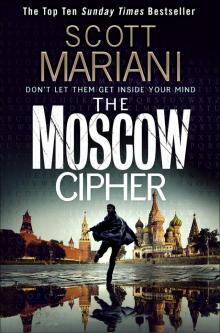 The Moscow Cipher
The Moscow Cipher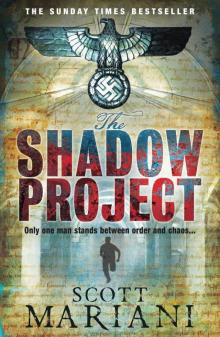 The Shadow Project bh-5
The Shadow Project bh-5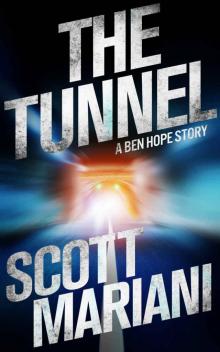 The Tunnel
The Tunnel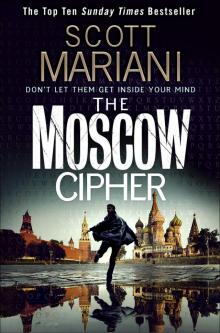 The Moscow Cipher (Ben Hope, Book 17)
The Moscow Cipher (Ben Hope, Book 17)